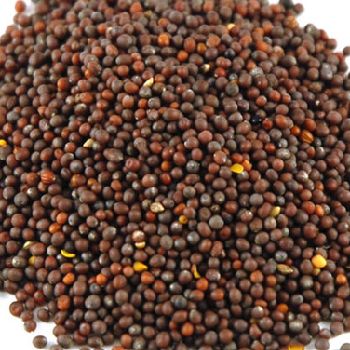Botanical name: Brassica nigra, Brassica juncea, Brassica alba
Family Name: Brassicaceae, Cruciferae
Common name: Mustard Seeds, Rape Seeds
Mustard seeds are the small round seeds. The seeds are usually about 1 to 2 mm in diameter and may be colored from yellowish white to black. They are important herbs in many regional foods and may come from one of three different plants:

Description:
Mustard seeds are a key ingredient in many cuisines worldwide, known for their pungent, slightly spicy flavor. They are widely used in pickles, condiments, sauces, and spice blends. Our high-quality mustard seeds are carefully selected to meet international standards.
Benefits of Mustard Seeds:
Specifications:
Container Stuffing Details:
1. Whole Mustard Seeds: - o 20ft Container: 20 Metric Tons
Private Labeling Services:
We provide private labeling services for whole mustard seeds, offering custom packaging and branding options according to your market needs.
Mustard Seeds in Other Languages:
English: Mustard Seeds, German: Senfkörner, French: Graines de moutarde, Italian: Semi di senape, Spanish: Semillas de mostaza, Swedish: Senapsfrön, Russian: Семена горчицы, Portuguese: Sementes de mostarda, Hindi: सरसों के बीज, Mandarin Chinese: 芥末种子
» Black mustards (Brassica nigra): The seeds are commonly seen in South Asia. The seeds are sharp and more pungent than other two varieties.
» Brown mustards (Brassica juncea): The seeds are native to sub-Himalayan plains of Northern India.
» White mustard (Brassica alba): The seeds are light straw-yellow colored and are slightly larger than the other two varieties. White seeds exhibit mild pungency.
Oil content in black and brown mustard seeds varies from 30% to 48%. While Oil content of white mustard varies from 25% to 33%.
Mustard seeds are an excellent source of selenium and a very good source of omega-3 fatty acids and manganese. They are also a good source of phosphorus, magnesium, copper, and vitamin B1.
Mustard seeds give edible oil which is one of popular cooking oils used as medium in many north Indian and Pakistani recipes. This seed is used as condiment in the preparation of vegetable and curries. The split seed and oil of Brown as well white mustard is used for pickling. Mustard paste is used in salad dressings, sandwiches, and hot dogs and in mayonnaise.